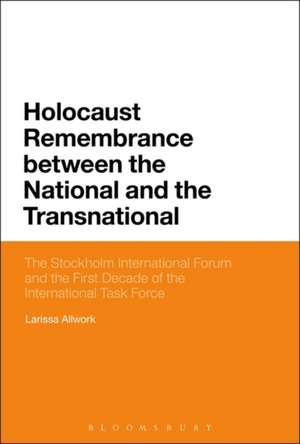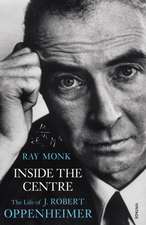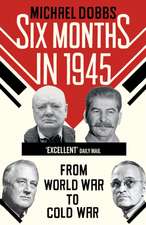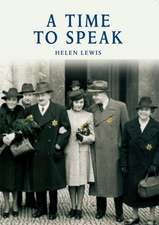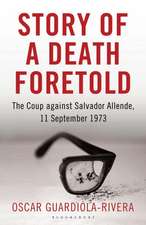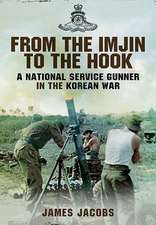Holocaust Remembrance between the National and the Transnational: The Stockholm International Forum and the First Decade of the International Task Force
Autor Dr Larissa Allworken Limba Engleză Paperback – 25 ian 2017
| Toate formatele și edițiile | Preț | Express |
|---|---|---|
| Paperback (1) | 257.41 lei 6-8 săpt. | |
| Bloomsbury Publishing – 25 ian 2017 | 257.41 lei 6-8 săpt. | |
| Hardback (1) | 773.97 lei 6-8 săpt. | |
| Bloomsbury Publishing – 29 iul 2015 | 773.97 lei 6-8 săpt. |
Preț: 257.41 lei
Preț vechi: 331.13 lei
-22% Nou
Puncte Express: 386
Preț estimativ în valută:
49.28€ • 50.56$ • 41.49£
49.28€ • 50.56$ • 41.49£
Carte tipărită la comandă
Livrare economică 26 februarie-12 martie
Preluare comenzi: 021 569.72.76
Specificații
ISBN-13: 9781350022430
ISBN-10: 1350022438
Pagini: 256
Dimensiuni: 156 x 234 x 17 mm
Greutate: 0.36 kg
Ediția:NIPPOD
Editura: Bloomsbury Publishing
Colecția Bloomsbury Academic
Locul publicării:London, United Kingdom
ISBN-10: 1350022438
Pagini: 256
Dimensiuni: 156 x 234 x 17 mm
Greutate: 0.36 kg
Ediția:NIPPOD
Editura: Bloomsbury Publishing
Colecția Bloomsbury Academic
Locul publicării:London, United Kingdom
Caracteristici
Limited-access International Task for Holocaust Research, Remembrance and Education documents used in book's writing
Notă biografică
Larissa Allwork is Teaching Fellow in Twentieth Century European History at the University of Leicester, UK.
Cuprins
AcknowledgmentsAbbreviationsPrefaceIntroduction - The Stockholm International Forum (2000) and the Transnational Turn in Memory Studies1. 'Money ought not to be the last memory of the Holocaust': The International and Transnational Context for the Stockholm International Forum (2000)2. Connecting with the World? The ITF and the Organization and Media Reception of the SIF 20003. The Global Legacies of the Stockholm International Forum (2000): The Subsequent Stockholm Conferences and the First Decade of the International Task Force4. Holocaust Remembrance Between the National and the Transnational: The International Task Force British/Lithuanian 'Liaison Project'5. The Intellectual and Institutional Context for Understanding the Stockholm International Forum (2000): The 'Cosmopolitan' Potentials of the SIF 2000 and the Limits of the 'New Cosmopolitan' Global TheoryConclusionBibliographyIndex
Recenzii
Meticulous research, detailed analysis, lucid writing, captivating narration-those descriptions characterize Larissa Allwork's impressive study of recent international initiatives to preserve memory of the Holocaust, expand education about that disaster, and promote awareness of the Shoah's implications for the world's future. Deftly evaluating how those efforts have tried to navigate what she calls "the ebb and flow of the space, place, and time of memory," Allwork herself preserves memory of important moments in post-Holocaust history, reminding her readers not only that much has been accomplished but also that much remains to be done if Holocaust remembrance is to continue responsibly and effectively.
Larissa Allwork's fascinating, detailed study explores the pathways of Holocaust memory with precision and critical intelligence. Through oral interviews with key players, and the use of published and unpublished material, the book delineates the ways in which 'official' memory has developed since the Stockholm Forum in the year 2000, and how these developments have been received by governments, NGOs and academics across Europe and North America. In doing so, Allwork reveals Holocaust memory to be a profoundly contested arena, and perhaps one of the most important barometers of political culture today.
This book provides an intensive contextualisation of the establishment of the ITF based on a thorough analysis of an impressive number of unpublished sources and interviews with key players. Allwork demonstrates how Holocaust memory became more and more institutionalized in Western as well as Eastern European countries. Although this process was not free of conflicts, this book demonstrates that the establishment of public institutions such as the Swedish Living History Forum and their collaboration with NGOs have a major impact on European and international Holocaust research, education and remembrance - keeping Holocaust history on the agenda.
Larissa Allwork's fascinating, detailed study explores the pathways of Holocaust memory with precision and critical intelligence. Through oral interviews with key players, and the use of published and unpublished material, the book delineates the ways in which 'official' memory has developed since the Stockholm Forum in the year 2000, and how these developments have been received by governments, NGOs and academics across Europe and North America. In doing so, Allwork reveals Holocaust memory to be a profoundly contested arena, and perhaps one of the most important barometers of political culture today.
This book provides an intensive contextualisation of the establishment of the ITF based on a thorough analysis of an impressive number of unpublished sources and interviews with key players. Allwork demonstrates how Holocaust memory became more and more institutionalized in Western as well as Eastern European countries. Although this process was not free of conflicts, this book demonstrates that the establishment of public institutions such as the Swedish Living History Forum and their collaboration with NGOs have a major impact on European and international Holocaust research, education and remembrance - keeping Holocaust history on the agenda.
